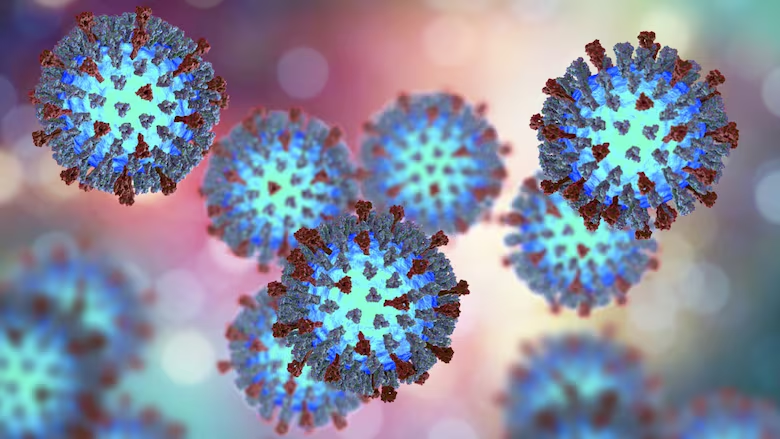York Region Public Health investigating adult case of measles with 'unknown' infection source
Man in his 30s had not travelled recently or been in contact with anyone ill, health authority says

York Region Public Health (YRPH) is investigating a confirmed case of measles where the source of infection is "unknown."
In a news release Thursday evening, the public health agency says it has confirmed measles in a man in his 30s who has not travelled recently or been in contact with anyone ill. The regional health authority says the case is "unique" compared to the three others recently recorded in the province — one of which sent a child to hospital in Toronto.
"YRPH is reaching out to known contacts who may have been exposed to this confirmed case of measles virus," the release says.
"Additional exposure locations are under investigation, and impacted contacts will be directly notified."
The man was fully vaccinated against measles and has a mild illness, said Dr. Barry Pakes, the medical officer of health for York Region.
YRPH says measles is a highly contagious viral infection that spreads easily through airborne transmission that can live in the air or on surfaces for up to two hours.
The virus was eliminated in Canada in 1998 thanks to vaccines, but the public health agency said there continue to be "sporadic cases" in the country, particularly as people travel during outbreaks in other parts of the world.
Those most at risk of reacting severely to the infection, which can result in brain damage or deafness, include infants under one year of age, pregnant individuals and those with a weakened immune system, the health authority says. Measles can also be fatal.
According to the health authority, people may have been exposed to this confirmed measles case if they were at the following locations:
- Melt N Dip Restaurant at 1018 Eglinton Ave. E. in Mississauga on Saturday, Feb. 24 from 5:30 to 8:30 p.m.
- The main waiting area in the emergency department of the Mackenzie Health Cortellucci Vaughan Hospital at 3200 Major Mackenzie Dr. W. in Vaughan on Monday, Feb. 26 from about 2:40 p.m. to 4:55 p.m.
- Vellore Medical Clinic at 10395 Weston Rd. in Woodbridge on Monday, Feb. 26 from approximately 12:10 p.m. to 5:30 p.m.
The regional health authority says people who may have been exposed should immediately confirm they have received two doses of the measles vaccine. Those born before 1970 would likely have had measles as a child and are thus protected, YRPH says.
Those who were present at these locations and are immunocompromised or those with an infant aged six months and younger should contact YRPH immediately for potential preventive treatment, the release says.
Symptoms of measles start seven to 21 days after exposure, according to YRPH. Anyone with symptoms, such as those outlined below, should stay home and not attend work or school:
- Cough.
- Runny nose (coryza).
- Fever.
- Red, watery eyes (conjunctivitis).
- Sensitivity to light.
- White spots in the mouth.
- A red, blotchy rash that appears from the third to the seventh day, beginning at the hairline and spreading down the body to the arms and legs. The rash is not typically itchy.
YRPH instructs people to call their health providers, before going to see them, to alert them that they may have measles. Even those vaccinated against measles should watch for symptoms for three weeks after exposure.
York Region's top doctor advises full vaccination
Individuals born after 1970 and before 1995 are encouraged to get two doses of the measles vaccine, said Pakes.
"People who are vaccinated can get a mild form of measles and we think they're much less likely to transmit it onwards, so that's certainly good news here," he said.
To prevent outbreak status in Ontario, Pakes said a 95 per cent vaccination rate is needed in the province.
"If [measles] comes back, all of that contact tracing, all of that activity is time consuming, expensive and potentially can lead to serious illness," he said. "That's what we need to avoid and we all have a part to play in that."
Pakes said, "It's about protecting yourself but also protecting everyone else."
He also noted the importance of proper testing, saying that a urine test and a swab are very important to detect active measles cases.

Nearby health authorities issue March break warning
Health authorities are issuing warnings to residents if they plan on travelling for March break, particularly during a large outbreak of measles in Europe, with over 40,000 confirmed cases. Additionally, the World Health Organization reported a 79 per cent increase in the number of global measles cases in 2023 compared to 2022.
Of the four cases recorded in Ontario since the start of the year, most have a link to international travel, according to a separate release from Peel Public Health (PPH) on Thursday.
"With March break approaching, Peel Public Health is advising all individuals to ensure they are up to date with measles vaccination, especially ahead of any international travel," the release says.
PPH says all Ontarians are eligible for two publicly funded doses of the MMR measles vaccine based on the healthcare provider's clinical judgment and the needs of the patient. It says first doses are routinely given after age one, with the second dose given when a child is between four and six years old.
The health agency advises residents who are returning from abroad who suspect they may have measles to wear a well-fitting medical mask, limit contact with others and alert border services or a flight attendant upon entering the country.
